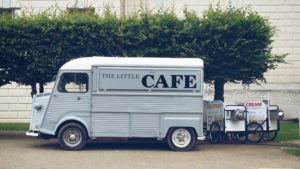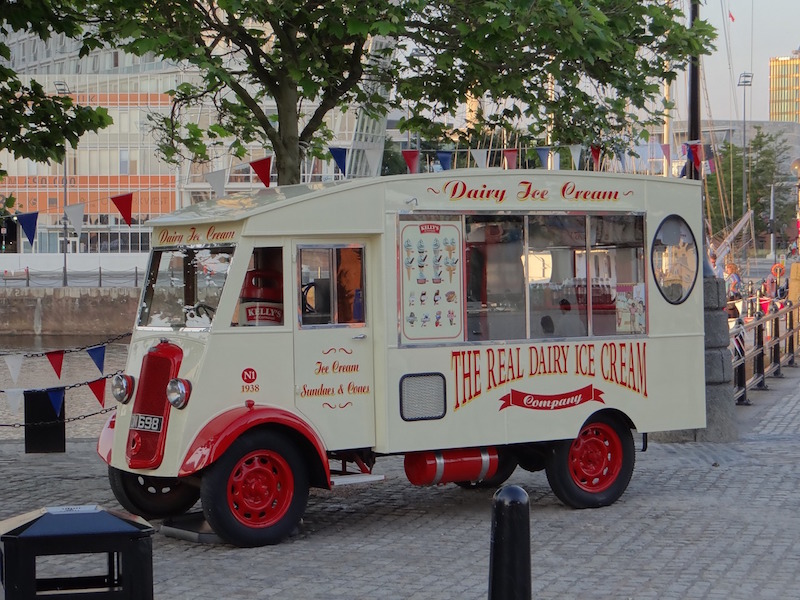Now is a great time to start your own mobile catering business. Our passion for street food in the UK continues to grow, and the sector is worth a whopping £1.2 billion a year. But it’s also a competitive market, with lots of legal essentials that need to be in place if you want to succeed. So, if you want to get your own slice of the pie (ahem) and learn how to start a mobile catering business, read our complete guide.
 1) Will your new catering business serve up something new to attract customers?
1) Will your new catering business serve up something new to attract customers?
The street food market may be booming. But you’ll find lots of other people looking to cash in on the trend. Deciding what you will sell is your first step. Perhaps you’ve got a great idea to fuse exotic flavours from around the world? Maybe your business idea is to sell retro favourites in a new way? Once you know what you’re going to sell, you need to work out what makes your business unique enough for punters to give you a try.
Do it today:
Decide what the unique selling point (USP) for your new mobile catering business is. For example:
- Fresh new flavours and fusions can make your new stall stand out.
- If you use sustainably sourced, local produce, then make sure you tell people about it.
- Maybe you’ve got a popular product but a unique pitch. For example, an ice-cream van right on the sea-front.
Whatever you’re planning, take the time to check out your potential competitors. Is there anyone selling something similar nearby. Even if there is, are there enough potential customers to sustain both businesses? If you can tick these boxes, then you’re ready to move on to the next stage of planning.
2) Get the paperwork sorted to protect your business financially
You might be brimming over with new recipe ideas and how to make your mobile catering van stand out. But arguably the most important thing you need to do before you get cooking is to get the legal stuff sorted. If you don’t, your new catering business might end up costing you big. Here we run through all the essential paperwork you’ll need to do:
a) Register with your local authority
The first thing to do is to register with your local authority. You need to complete this registration before you start trading. As a general rule, aim to try to do this at least 28 days before you plan to open.
Do it today:
- Find your local authority here.
 b) Licences
b) Licences
If you’re going to be selling from your mobile catering van on a public street, you’ll need to get a Street Trading Licence. This is one of the items you should tick off your list straight away when determining how to start a mobile catering business.
Do it today:
- Apply for your Street Trading Licence from your local authority.
- Find your local authority here.
c) Insurance
- Yes, setting up your own mobile catering business will give you the freedom to set your own hours. And it’s a chance to become your own boss. But starting your own business also means financial risk. Luckily. You can protect yourself from the things that go wrong with the help of insurance. If you’re not sure where to start, look for an independent insurance broker that specialises in mobile catering insurance. They can be an invaluable source of free advice. You can make the most of their knowledge and understanding of the sector, and they can explain exactly what risks you may face and give your insurance options to cover it.
Every mobile catering business is different and will different levels of cover. But as a general guide, here are some of the most common types of insurance to consider:
 Commercial vehicle insurance – If you run your mobile catering business out of a van, you’ll need specialist insurance. If you use a trailer, you’ll need appropriate towing cover for your car as well as the trailer itself. Commercial vehicle insurance is essential to make sure you’re legal for driving on the road. And it will also need to cover the specialist equipment inside the van, such as fridges, ovens, and tills.
Commercial vehicle insurance – If you run your mobile catering business out of a van, you’ll need specialist insurance. If you use a trailer, you’ll need appropriate towing cover for your car as well as the trailer itself. Commercial vehicle insurance is essential to make sure you’re legal for driving on the road. And it will also need to cover the specialist equipment inside the van, such as fridges, ovens, and tills.- Stock cover – If you lose your stock in an accident, due to equipment failure or theft, stock cover insurance will pay for its replacement.
- Public liability insurance – This will cover you for any injury to persons or damage to property because of something connected to your mobile catering business. This includes food poisoning, a road traffic accident, or an allergic reaction to mislabelled food. If someone sues you for compensation, the legal fees and payouts can run into the £millions depending on the size of your business, so comprehensive cover is wise.
- Employer’s liability – This insurance is a legal requirement if you employ any members of staff, even if they are part-time or contracted. It protects you if they suffer any injury or damage connected to your business. If you don’t have it, you can be fined.
- Money cover – Protecting the cash you take while it is on your stall and in transit to the bank.
- Personal injury insurance – Takes care of the essential bills (like your mortgage) if something happens and you can’t work.
Do it today:
Insurance is a must-have for any successful catering business. But saving money on insurance is also crucial if you want your new business to thrive.
Here are our tips to get the best price on your mobile catering insurance:
- Look for specialist insurance companies that are used to insuring mobile catering businesses. They understand the risks you face and are likely to offer a cheaper premium.
- Look for a tailored package rather than a one-size fits all deal. You don’t want to pay for anything you don’t need (and you want to be sure you are definitely getting the level of cover you do need.)
- Always shop around. Just like your personal car insurance, there can be a big difference between prices for the same level of cover.
- If you don’t have time to call insurance companies, or don’t know where to start, use a specialist insurance broker to do the legwork for you. This could even save you money in the long run as your insurance broker will know exactly what cover you need and don’t need.

d) Register as a business
Just like any new business, you need to register with the government. You have two options. You can register as a limited company or as a sole trader/partnership. There are different benefits to each. Registering as a sole trader is generally more straightforward. But if you register as a limited company your business is classed as separate to you, so if something goes wrong and you are sued or declared bankrupt, it is the business that is liable, not you. Of course, you can still protect yourself as a sole trader from this financial risk with insurance.
Do it today:
- Register your mobile catering business
e) Food safety training
Keeping the food you make safe to eat is vital for your mobile catering business. The Food Standards Agency has strict guidelines on food preparation and storage, which will help you to keep yourself, your employees, and the public safe.
Do it today:
- Find food safety training courses
- Undertake a risk assessment /HACCP. Sign up for a MyHACCP account, which will guide you step by step through the procedures you need to follow.
f) Check your equipment is safe
By law, gas equipment has to be tested by a qualified Gas Safe engineer every year. A qualified electrician can check your electrical equipment is safe to use.
Do it today:
g) Ensure you have appropriate hand-washing facilities to meet requirements
 All catering businesses, including mobile caterers, must have hand-washing facilities. Anti-bacterial hand gel is not enough. Your hand-washing facilities must be separate from your pot washing facilities. This is one item that’s often overlooked when researching how to start a mobile catering business.
All catering businesses, including mobile caterers, must have hand-washing facilities. Anti-bacterial hand gel is not enough. Your hand-washing facilities must be separate from your pot washing facilities. This is one item that’s often overlooked when researching how to start a mobile catering business.
h) Get to grips with self-assessment to make tax less taxing
When you run your own mobile catering business, you’ll be responsible for filling in your own tax self-assessment. Remember, items or services that you purchase for your business are tax deductible and reduce your tax bill. This includes equipment, stock/ingredients, and your insurance.
For example, in the 2019/20 tax year, you can earn up to £12,500 before you need to pay tax. Your income between this amount and £50,000 will be taxed at 20%. Any income over £50,000 is taxed at 40%.
Your turnover (the amount you make through sales) is £36,000
But you’ve spent £12,000 on equipment, ingredients, staffing costs, and legal compliance (insurance, etc.), which you claim back on your self-assessment form. That means your income is £24,000. You’ll only pay tax on £11,500 as the first £12,500 is your personal allowance.
Do it today:
- Set up a filing system now where you can save all your receipts. You’ll need to keep these for every item that you intend to claim.
- Find out more about your personal allowance
- Save yourself money by always filing your tax return on time. If you don’t, you’ll be automatically fined.
- Start your self-assessment
3) Find a mobile catering pitch
Where you sell your product can make a massive difference to how well you do. Punters head to street food markets in search of authentic original flavours. If that’s you, you’re sure to do well. Or maybe you offer delicious food that’s easy to eat on the go? If so, you could tap into the lunchtime market with a mobile catering pitch close to busy office blocks. At festivals, you’ll have a captive, hungry audience who can’t just pop out to the local supermarket to grab a bite to eat. Catering for weddings can be lucrative. Or if you plan to sell ice-creams, find a mobile catering pitch with plenty of footfall.
Do it today:
- Check out streetfoodmarkets.co.uk.
- Sign up as a wedding caterer.
- Find a farmers’ market in London.
- Discover a Christmas Market near you.

4) Keep the neighbours happy by sticking to these regulations
If you’re planning on running a mobile ice-cream van or something similar, your chimes are a great way to get customers to come to you. But it’s important to remember the strict rules about where and where they can be sounded. This includes:
- Chimes cannot be played more than once every two hours in any one stretch of street
- Chimes cannot be louder than 80 decibels
- Your music should not last more than 12 seconds
- Chimes should not be played in sight of any other van
- Chimes can be played only once on the approach to a stopping/selling point and only once while stationary.
- There must be an interval of at least 2 minutes between the chimes being played
- Chimes cannot be sounded within 50m of a hospital, 50m of a school during school hours or within 50m of a church or place of worship on a Sunday
Do it today:
- Read the full Code of Practice from DEFRA
5) Understand the Food Hygiene Rating Scheme because a high score will help your business grow
The Food Hygiene Rating Scheme is run by local authorities together with the Food Standards Agency. IT applies to a wide range of catering businesses, from pubs and restaurants to mobile caterers. It’s designed to empower consumers by giving them an indication of how well you follow food safety and hygiene procedures. The ratings range from 0 (low) to 5 (high).
Do it today:
You can read the ratings for every catering establishment here.
- Displaying your rating on your van or stall lets potential customers know how well the inspectors felt you followed hygiene procedures. A low rating may mean less business, while a higher rating could encourage customers to try your food.
 6) Stall, trailer or van? Decide what you’ll sell from
6) Stall, trailer or van? Decide what you’ll sell from
The whole point of running a mobile catering business is that you can go to where your customers are. You have several options:
- A stall/gazebo. These are cheap to buy and easy to transport in a normal car. But using one means you’ll need to allow extra time to set up/pack down. They can also be more difficult to use in poor weather, such as rain or winds.
- Towed trailer. This is the next step up from a gazebo. Bear in mind you’ll need a vehicle that is capable of towing it. It’s also wise to have some extra driving lessons in case you need to reverse around a muddy field.
- Motorised catering van. This is usually the most expensive option. On the plus side, everything you need is all contained in one place, and you’ll ready to get going as soon as you arrive.
Conclusion
Comparatively low start-up costs and potential big profit margins make starting a mobile catering business a sound business move. With a great idea, excellent organisational skills to tackle the paperwork, and a passion to succeed, you can become your own boss. Spend a few minutes reading through our ‘how to start a mobile catering business’ guide above. Tick off each of the things to ‘do today’. And get ready to drive your new business venture towards success.

